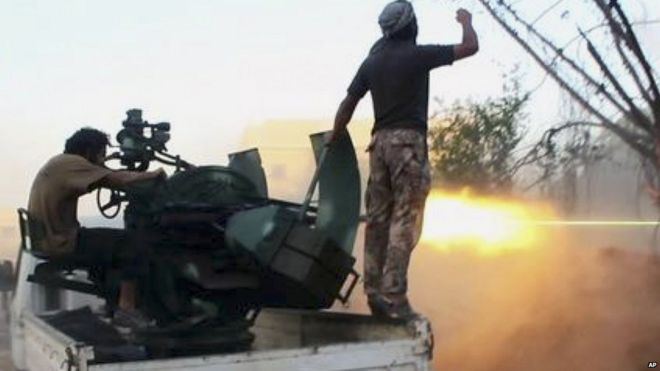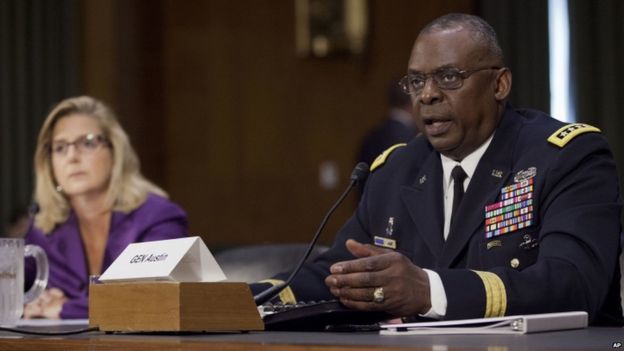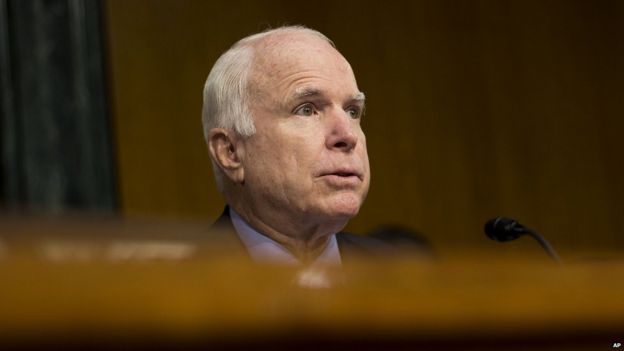88m3
Fast Money & Foreign Objects
Turkey Agrees To Allow Use Of Its Soil For Airstrikes Against ISIS
JULY 23, 2015 5:28 PM ET
SCOTT NEUMAN

A U.S. Air Force plane takes off as a Turkish Air Force fighter jet taxis at the Incirlik airbase, southern Turkey, in 2013. Reversing an earlier policy, Ankara has agreed to allow the U.S.-led coalition to fly anti-ISIS airstrikes from the base.
Vadim Ghirda/AP
Updated at 5:35 p.m. ET
Turkey has agreed to allow anti-ISIS coalition warplanes to begin using the air base atIncirlik in the country's east to carry out airstrikes against the extremist group in neighboring Syria, NPR has confirmed.
The news, also reported in The Wall Street Journal and elsewhere, marks a sudden shift in Ankara's policy that until now has barred the U.S. and its allies from using the base for anything other than unarmed surveillance drones directed against the self-declared Islamic State.
"The United States and Turkey have held ongoing consultations about ways we can further our joint counter-ISIL efforts," National Security Council spokesperson Alistair Baskey tells NPR's Brian Naylor, referring to an acronym that the administration uses for the Islamic State.
"We have decided to further deepen our cooperation in the fight against ISIL, our common efforts to promote security and stability in Iraq, and our work to bring about a political settlement to the conflict in Syria," Baskey says. "Due to operational security I don't have further details to share at this time."
According to The Associated Press, President Obama and Turkish Prime Minister Recep Tayyip Erdogan discussed the agreement by telephone on Wednesday.
The AP says:
"Turkey has yet to publicly confirm the agreement, and the U.S. officials requested anonymity because they weren't authorized to comment publicly. The White House declined to confirm the agreement, citing operational security concerns, but White House spokesman Josh Earnest said Obama and Erdogan had discussed efforts to fight IS during their phone call Wednesday.
"'The two leaders did agree that we would deepen our cooperation as we take on this ISIL threat,' Josh Earnest said, using an alternative acronym for the militant group."
The WSJ reports:
"Use of the base is part of a broader deal between the U.S. and Turkey to deepen their cooperation in the fight against Islamic State, which is growing increasingly perilous for Turkey.
"The agreement comes after months of tense negotiations between U.S. officials seeking greater freedom to strike the extremist forces and reluctant Turkish leaders who have resisted American pressure to play a larger role in the fight across the border."
Turkey Agrees To Allow Use Of Its Soil For Airstrikes Against ISIS
JULY 23, 2015 5:28 PM ET
SCOTT NEUMAN

A U.S. Air Force plane takes off as a Turkish Air Force fighter jet taxis at the Incirlik airbase, southern Turkey, in 2013. Reversing an earlier policy, Ankara has agreed to allow the U.S.-led coalition to fly anti-ISIS airstrikes from the base.
Vadim Ghirda/AP
Updated at 5:35 p.m. ET
Turkey has agreed to allow anti-ISIS coalition warplanes to begin using the air base atIncirlik in the country's east to carry out airstrikes against the extremist group in neighboring Syria, NPR has confirmed.
The news, also reported in The Wall Street Journal and elsewhere, marks a sudden shift in Ankara's policy that until now has barred the U.S. and its allies from using the base for anything other than unarmed surveillance drones directed against the self-declared Islamic State.
"The United States and Turkey have held ongoing consultations about ways we can further our joint counter-ISIL efforts," National Security Council spokesperson Alistair Baskey tells NPR's Brian Naylor, referring to an acronym that the administration uses for the Islamic State.
"We have decided to further deepen our cooperation in the fight against ISIL, our common efforts to promote security and stability in Iraq, and our work to bring about a political settlement to the conflict in Syria," Baskey says. "Due to operational security I don't have further details to share at this time."
According to The Associated Press, President Obama and Turkish Prime Minister Recep Tayyip Erdogan discussed the agreement by telephone on Wednesday.
The AP says:
"Turkey has yet to publicly confirm the agreement, and the U.S. officials requested anonymity because they weren't authorized to comment publicly. The White House declined to confirm the agreement, citing operational security concerns, but White House spokesman Josh Earnest said Obama and Erdogan had discussed efforts to fight IS during their phone call Wednesday.
"'The two leaders did agree that we would deepen our cooperation as we take on this ISIL threat,' Josh Earnest said, using an alternative acronym for the militant group."
The WSJ reports:
"Use of the base is part of a broader deal between the U.S. and Turkey to deepen their cooperation in the fight against Islamic State, which is growing increasingly perilous for Turkey.
"The agreement comes after months of tense negotiations between U.S. officials seeking greater freedom to strike the extremist forces and reluctant Turkish leaders who have resisted American pressure to play a larger role in the fight across the border."
Turkey Agrees To Allow Use Of Its Soil For Airstrikes Against ISIS






 at when he falls into the wrong hands
at when he falls into the wrong hands



